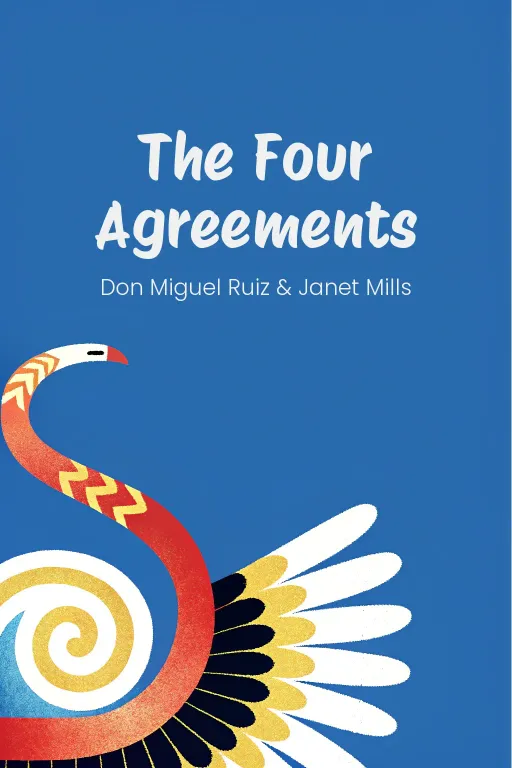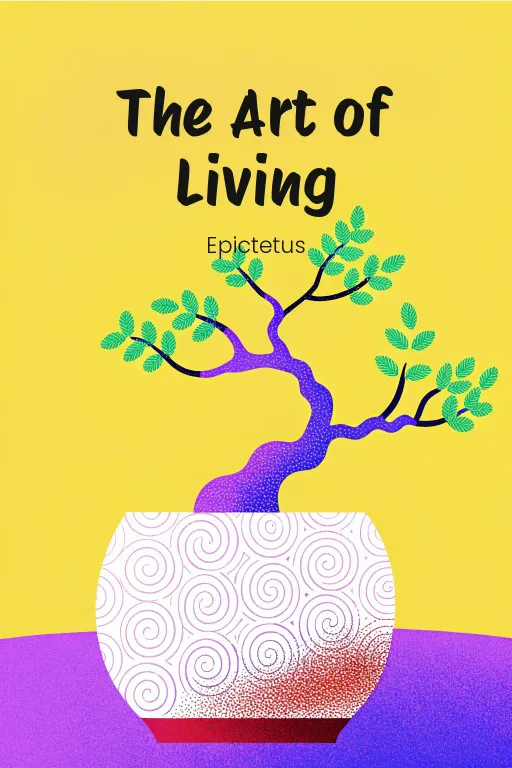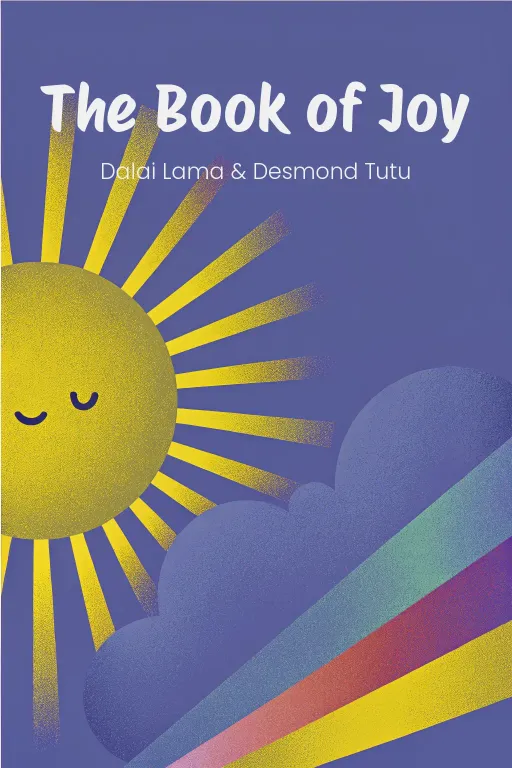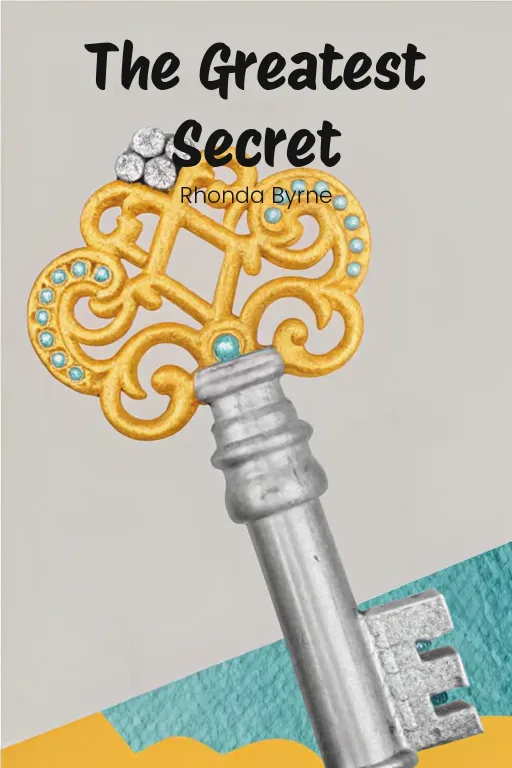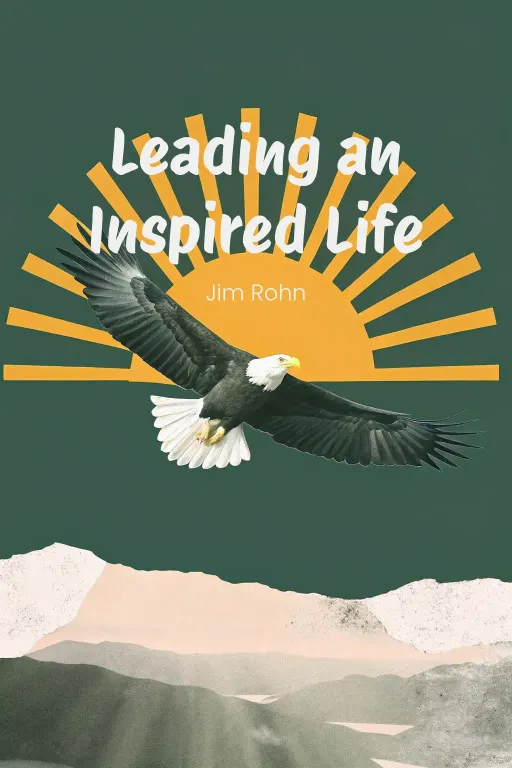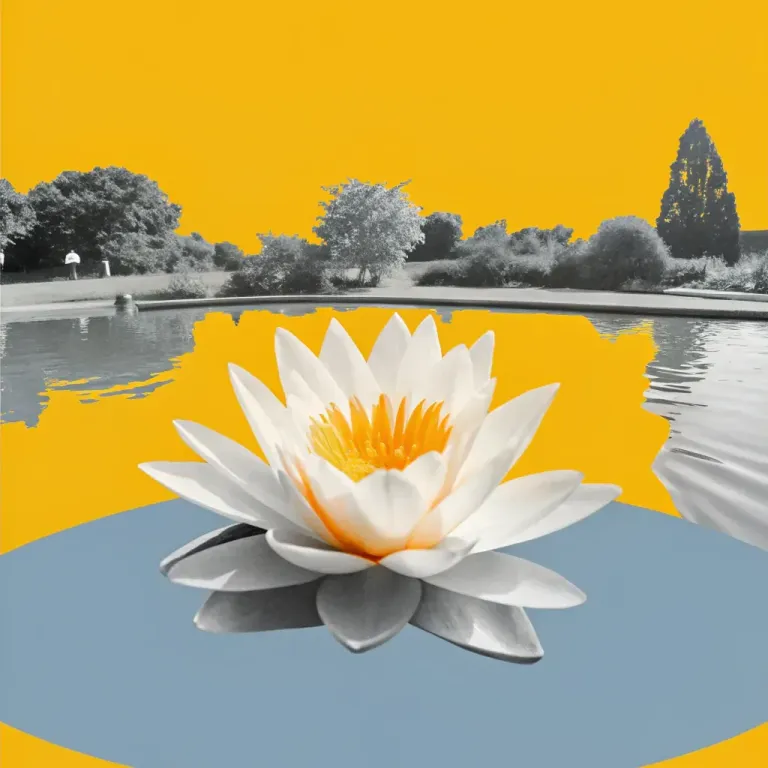
Find Joy: Face Life's Storms With Strength
Podcast by Beta You with Alex and Michelle
Lasting Happiness in a Changing World
Find Joy: Face Life's Storms With Strength
Part 1
Alex: Hey everyone, welcome! Can you imagine actually “finding” laughter when you're facing exile, cancer, or even apartheid? Today, we're diving into this incredible conversation between the Dalai Lama and Archbishop Desmond Tutu. They explored how to discover real, lasting joy, even when life throws its worst at you. Michelle: Joy in the face of apartheid? Exile? Wow. That's not just being optimistic; it almost sounds like a superpower. I mean, how do you even start tackling something like that when life, you know, just feels…heavy? Alex: That's what's so amazing about this book! It's so much more than just, like, a fluffy, feel-good thing. It's about understanding that joy is something way deeper than just fleeting happiness – like, the temporary pleasure of eating your favorite dessert. It’s about really embracing both the joy and the suffering as essential parts of being human and, importantly, learning to carry them together. Michelle: Interesting. So, it's not about pretending all the bad stuff isn't happening, but building, uh, something a bit more resilient? Alex: Precisely! This week-long discussion between the Dalai Lama and Desmond Tutu isn't just stories and laughter – although there's plenty of that! It actually breaks joy down into practical, applicable wisdom, grounded in science, spirituality, and our shared human experience. Michelle: Alright, but what exactly are we unpacking today? Alex: Great question! So, today's journey really has three main parts. First, we're going to explore the essence of joy – what makes it different from just plain happiness, and why that difference is important. Second, we'll look at the 'thorns' of suffering, the things that often block our path to joy. And finally, we'll climb into the eight pillars - these qualities, like humility and gratitude, that can really transform joy into something that lasts. Think of joy as a tree: its roots are in compassion, and it grows, and stands strong, even through some pretty tough storms in life. Michelle: A tree, huh? Okay, well, hopefully, there aren't too many complicated branches on this metaphor because I'm ready to get started dissecting this. So, where do we begin?
The Nature of True Joy and Happiness
Part 2
Alex: Okay, let's dive right in. We need to understand the difference between joy and happiness. We use these words like they're the same thing, but they’re really not. Michelle: Yeah, I always thought happiness was, you know, that quick buzz you get from a good cup of coffee or finishing a whole season on Netflix. That kind of thing? Alex: Exactly! Happiness is often linked to external things – those moments of pleasure or when you nail a goal at work, or yes, that perfect latte. But joy, like the Dalai Lama says, goes way deeper. It’s a lasting kind of inner peace that sticks around even when things get tough. Michelle: Right, so joy is less about needing the latte and more about… being okay even without it? Alex: More or less. Think about the Dalai Lama’s life. He lost his homeland, Tibet, which is huge on so many levels. But he didn't just give in to anger or sadness. He actually found joy by focusing on being kind and understanding how everyone suffers in some way. He's not avoiding the pain; he's facing it with a purpose. Michelle: That's pretty deep…using suffering to connect with others instead of just dwelling on it. But how does anyone actually get there? What stops all the chaos of life from just drowning out any chance of joy? Alex: Things like fear, anger, and even chasing success can block us. Tutu calls it a kind of "tightening." We get so caught up in all that external stuff that we forget to do the inner work we need to actually grow joy. Michelle: So, are we all just hamsters on a wheel, chasing these short-term highs and totally missing that there’s another way to live? Alex: Precisely. Happiness depends on those external rewards, so it disappears quickly. You win, you get off the wheel, and then… nothing. Joy, on the other hand, comes from things like really thinking about yourself, showing compassion, and being grateful. Michelle: Alright, I'm with you so far. But if joy is internal, are you saying it’s something you have to work at? Like, is joy a gym membership now? Do I have to schedule "joy reps" between workouts? Alex: In a way, yes! They talk about building joy like it’s something you actively do, not just something that happens to you. Changing how you see challenges, expressing gratitude, even being happy when others succeed— Buddhists call that “mudita”—these are all ways to build joy. Michelle: “Mudita”? So, I'm supposed to be happy when someone else’s kid gets into Harvard, and mine is struggling to pass high school? Alex: I know, it's not easy. But “mudita” asks us to see joy as something we share, not something we’re competing for. When you celebrate someone else’s win, it makes you more able to feel joy yourself. It’s a big shift in how you think, and it goes against feeling envious or always comparing yourself to others. Michelle: I get it. It’s like training your brain to cheer for other people, even when you’re having a hard time. There’s something freeing about that, though I can't imagine it's an overnight thing. Alex: Oh definitely, it takes work. Perspective matters a lot, too. The Dalai Lama tells this story about a young boy living in poverty. Instead of focusing on what he couldn't control, he started seeing his suffering as part of something bigger that everyone shares. That changed how he felt from being alone to being connected, and it turned his sadness into strength. Michelle: So, the kid didn't obsess over being poor but found comfort in knowing he wasn’t the only one struggling? Alex: Exactly. Seeing your hardships as part of the bigger human story is key to making joy last. That's why the Dalai Lama stresses starting with looking inward instead of trying to find happiness outside yourself. Michelle: And yet, we’re constantly told to look outward for happiness—better jobs, bigger houses, fancier vacations. We’re just not wired to resist those shiny things. Alex: True, but those things don't last. Tutu says that chasing joy outside yourself doesn't just leave you empty—it can make you feel even more frustrated when you don't reach those goals. That’s why he and the Dalai Lama suggest things like gratitude and compassion, which keep joy anchored inside. Michelle: Okay, let’s talk about gratitude for a second. “Be thankful for what you have” sounds like such an empty thing to say when things are tough. How can it really help when life is messy? Alex: I understand why you’d say that. But gratitude isn’t about pretending everything's perfect; it’s about seeing the good within the mess. Tutu, for example, says he starts each day by thinking of three things he's grateful for. And they're not huge, life-changing things—it could be something as simple as sharing a laugh or feeling the sun. Michelle: Hmm. So, gratitude is less about pretending life is great and more about finding those small moments of light when things are dark? Alex: Exactly. And those small moments, when you really notice them, build a base for lasting joy. The Dalai Lama goes even further, seeing gratitude as recognizing that just by being alive, we have this huge opportunity to connect with others and find meaning. Michelle: That’s a pretty big idea, but it makes sense. If we start each day focusing on the good stuff, maybe it helps us stay grounded before all the chaos hits. Alex: That’s the idea. These little rituals of gratitude turn us inward, where joy can grow. But it's not just about gratitude. Being kind, forgiving, and really listening to others are just as important. They shift our focus from ourselves to others, and that turns joy into a shared experience, not just something you achieve alone. Michelle: Like a web—stronger because it’s all connected. I guess being compassionate and grateful ties in with this idea of shared joy? Alex: Exactly! Archbishop Tutu talks about the African idea of Ubuntu: “I am because we are.” Joy grows when we see how connected we are – our shared humanity. Even when there's loss or injustice, Tutu shows that community and forgiveness rebuild relationships, turning pain into places where joy can still be found. Michelle: That's a powerful image—joy as a kind of glue, fixing what's broken through working together. They’re definitely making a strong case for joy as something that can change things, not just make them look pretty. Alex: Exactly. Their message is clear: true joy isn’t about those quick, personal wins; it’s about doing things that build connections, heal wounds, and make our shared lives better. And when we work at it, joy doesn't just change us—it spreads out to others.
Obstacles to Joy
Part 3
Alex: So, having a handle on what joy is all about, we can dig into the things that actually block it. And this, for me, is where it gets super interesting. The Dalai Lama and Archbishop Tutu make the case that most of what gets in the way of our joy isn't external at all—it's internal. Things like negative emotions, always comparing ourselves to others, fear, and those mental loops we can't seem to escape can create unnecessary suffering. They even suggest that a lot of our suffering is, well, self-inflicted. Michelle: Whoa, hold up a second. "Self-inflicted" suffering? Okay, but that sounds a little bit like victim-blaming, doesn't it? I mean, if you've just lost your job or you're dealing with a serious illness, is it “really” fair to say that the stress and fear you're experiencing is self-created? Alex: No, that’s a totally valid point. They're definitely not dismissing real struggles. But think about it this way: When something tough happens, isn't it often our own thoughts and interpretations of the situation that make it feel even worse? The Dalai Lama talks a lot about how much time we spend dwelling on "what could go wrong" or how we obsess over things completely out of our control. It’s that mental fixation, our reaction so to speak, that amplifies the suffering. Michelle: Okay, I see. So, they're saying that pain is part of life, but suffering...suffering is more of a choice? Alex: Exactly! For example, the Dalai Lama mentions how people get so caught up in worrying about things they can't control or comparing themselves to others. It's like carrying a ton of extra baggage on an already difficult journey. Michelle: Ugh, now I'm picturing a suitcase overflowing with guilt, envy, and existential dread. But how do we actually unpack that thing? How do we lighten that load without ignoring reality? Alex: Well, it starts with understanding those emotions instead of running from them. They call it building "mental immunity," like training your mind to take a step back, observe what you’re feeling, and respond with a sense of balance instead of just reacting. Both leaders “really” see this kind of inner peace as fundamental to joy. Michelle: Mental immunity? So, you're saying my brain needs a flu shot for stress and anger? Alex: In a way, yes! It’s about gradually changing how we deal with negativity. The Dalai Lama often uses the analogy of how our bodies build immunity by being exposed to illness. By facing adversity—but in small, manageable doses—you're teaching your mind how to respond without being completely overwhelmed. And there's another layer too: reframing. Michelle: Ah, the classic mindset shift thing, right? Like, "Oh, this problem is actually a great opportunity for growth," even though it feels like hitting a brick wall at full speed? Alex: Precisely. But this isn't just like, you know, motivational poster stuff. For example, Archbishop Tutu often talked about his work with the Truth and Reconciliation Commission in South Africa. Can you imagine being surrounded by grief and anger from decades of apartheid? He shared that one time, a man broke down while sharing his story of torture. And instead of trying to dismiss his pain or "fix" things, Tutu just wept with him. That shared vulnerability reframed the grief, turning it into connection and healing. Michelle: So, they're not suggesting we just sugarcoat suffering, but that we actually need to lean into it as a starting point for resilience? Like with that man—Tutu met him exactly where he was, without judgment or trying to offer solutions. That seems...pretty different from how a lot of us usually react to anger or sadness. Alex: Definitely! And by meeting emotions head-on, rather than suppressing or avoiding them, the energy of those feelings can be transformed. In that case, the man’s grief turned into a channel for connection, which is why Tutu always emphasized acceptance as a key to joy. Michelle: Acceptance sounds great in theory, but let's be honest—it's a tough one. If someone's dealing with oppression or chronic pain, telling them to "just accept it" can feel dismissive, even insulting. Alex: I hear you, but the way they describe acceptance isn't passive. It's not about giving up or not wanting change. It’s more about seeing reality clearly, without fighting it or denying it, and then focusing your energy on what you can actually change. The Dalai Lama even suggests asking yourself, "If there’s nothing I can do about this, why worry?" It can be quite liberating. Michelle: That does kind of flip the script. I mean, worrying can often feel productive, even if it isn't, right? But what about emotions like sadness or anger—especially emotions that feel like they demand action rather than just quiet acceptance? Alex: That’s a “really” important point. Both leaders acknowledge the power of these emotions when they're used constructively. Like, anger about injustice can drive “really” powerful action, but they insist it has to come from a place of compassion, not revenge. Otherwise, the anger just takes over instead of motivating you. Michelle: So, righteous anger is okay, but vindictive anger is self-defeating. Got it. But what about sadness? Where does that fit into all of this? Alex: Well, they argue that sadness has the potential to deepen connection and empathy. Instead of being something to avoid, it can actually make us more human. Tutu often shared stories about the grieving mothers in post-apartheid South Africa. Their pain was unimaginable, but by embracing their loss, they found the strength to forgive those responsible. That acceptance, and the act of forgiveness, can “really” heal and uplift. Michelle: Forgiving torturers? Actually not just healing but carrying the weight of an entire nation? Wow. They must have discovered a level of resilience that's way beyond what most people experience. Alex: Absolutely, it's something extraordinary, but their courage came from reframing what forgiveness “really” means—they saw it, not as excusing the guilty, but as breaking the cycle of anger and resentment. By doing that, they weren't just healing themselves; they were helping to build resilience in the entire community. Michelle: Okay, I’m starting to see how those tools—acceptance, reframing, compassion—how they pave the way for overcoming these obstacles to joy. But how do we actually practice them in our day-to-day lives? I mean, saying "build mental immunity" sounds great, but what's the starting point? Alex: It’s actually simpler than you might think! “Really” basic practices like mindfulness and gratitude can make a huge difference. Just taking a few deep breaths, writing down moments of gratitude—these kinds of small rituals can train your brain to pause before it automatically defaults to stress or comparison. Michelle: So, nothing earth-shattering? Just developing these “really” small habits that build up our mental strength over time? Alex: Exactly! Both leaders emphasize that these small changes add up over time—like planting seeds in a garden. Our mental habits shape how joy takes root, grows, and spreads in our lives. Michelle: That's incredible. It makes it seem like these obstacles—anger, sadness, stress—aren't the enemies of joy. They're actually an invitation to change how we respond and how we connect with each other.
The Eight Pillars of Joy
Part 4
Alex: So, now that we've talked about the obstacles to joy, let's dive into some actionable strategies, right? That's where these Eight Pillars of Joy come in. It's essentially a structured approach, qualities of mind and heart, that helps us “really” embody joy, linking what we do to universal values. Think of them as the building blocks that the Dalai Lama and Archbishop Tutu used to navigate life’s challenges, all while staying resilient and maintaining a deep sense of purpose. Michelle: Okay, so we're switching gears from identifying joy-killers to actually building joy on purpose. I’m in. So, what are these pillars, and how do they all connect? Alex: Well, they're broken down into two categories: the qualities of the mind and the qualities of the heart. For the mind, we have Perspective, Humility, Humor, and Acceptance. And for the heart, we have Forgiveness, Gratitude, Compassion, and Generosity. What's “really” great is that these aren't just some abstract ideas. They're super practical things we can intentionally incorporate into our lives. This helps us sync our mindset and actions, leading us towards a more fulfilling way of living. Michelle: So, are we talking about constructing joy one step at a time? Should we start with what you consider the foundation? Alex: Perspective is where we kick things off. This is about broadening our viewpoints, right? The Dalai Lama always emphasizes the importance of stepping back when we’re facing challenges. We need to reframe them as part of the larger human experience. The idea is to see that what we're going through isn't happening in isolation but is something shared by many. Recognizing this can “really” ease a lot of anxiety and loneliness, you know? Michelle: Okay, so it's about changing our viewpoints. But practically speaking, how do we do that? I mean, if I am in rush hour on Monday and my coffee machine breaks, am I supposed to take a step back and tell myself, "Oh right, I forgot humanity lacks caffeine sometimes.” Alex: Well, maybe not in that moment, but let me give you a real-world example. There's this story the Dalai Lama tells about meeting a boy living in extreme poverty. Despite dealing with “really” tough circumstances, this kid found comfort knowing that his suffering wasn't unique to him, it was part of a larger human story. Shifting his focus didn't change his circumstances, but it helped him cope with feeling isolated or singled out by hardship. Michelle: So instead of the "Why me?" he was thinking, "I'm not alone in this." That's pretty humbling. And it sounds like humility is related to this whole reframing thing, right? Alex: Exactly! Humility comes into play when you start seeing yourself as part of the collective human struggle. It's not about downplaying your own importance, but more about acknowledging that nobody makes it through life completely on their own. Archbishop Tutu was a great example of this. Even with all his global recognition, he would always say that he was just another flawed and vulnerable human trying his best, just like everyone else. Michelle: Yes! No standing on a moral high ground. Reminds me of that one colleague who starts a presentation by joking about themselves, and that bit of vulnerability just makes you trust them more. Alex: That’s how it works! Humility breaks down barriers and builds relatability. This then makes way for stronger connections between people, right? And when there’s connection, then comes joy. Michelle: Okay, I see the link between humility and perspective. But what about humor? I love a good laugh, but can jokes actually elevate joy? Alex: Humor is so much more than just making people laugh. It's about lowering our defenses and creating shared moments of joy. The Dalai Lama and Archbishop Tutu were masters of this, always joking, even about serious stuff. I remember Tutu once teasing, "Sometimes you must act like a holy man," and the laughter that followed really brought intimacy to their conversations, you know? Humor releases tension, builds resilience, and reminds us to not take ourselves too seriously. Michelle: So, humor isn't just a tension breaker; it’s a humanizer. It somehow makes life less... overwhelming. But Acceptance, the next pillar, that's when we get serious again, right? Alex: Serious, but powerful. Acceptance is about embracing both the good and the bad in life without getting stuck on the things you can't change. The Dalai Lama put it perfectly: "Why be unhappy if you can change something? And if you can't, what's the point of being unhappy?" It's not giving up, but more about using your energy where it matters. Michelle: I like that. Acceptance isn’t some passive surrender; it’s more like adjusting course when the winds change. Any examples of Tutu actually doing this? Alex: Definitely. He often talked about families who had lost loved ones during apartheid in South Africa. After going through so much suffering, they turned their pain into forgiveness rather than seeking revenge. By accepting their reality and refusing to stay bitter, they found a sense of peace that helped them start healing. That's the transformative power of acceptance; it doesn't take away the suffering, but it opens the door for growth. Michelle: Right, so we've got Perspective, Humility, Humor, and Acceptance – quite the toolkit for shaping the mind. Let's change gears to the heart and dive into the next four -- What's up first? Alex: Forgiveness. It's a tough one, but so important. Tutu's work with the Truth and Reconciliation Commission in South Africa is a perfect example. Forgiveness is about freeing yourself from anger. It doesn't excuse what happened, but it's about choosing freedom over the bitterness that eats you up inside. Michelle: And you're saying this happened on a large scale after apartheid? People forgave those who had caused such deep trauma – isn't that almost too much to ask? Alex: It sounds like it, but Tutu always said that forgiveness is something very human that comes from shared pain. Mothers who had lost their children, communities that had seen terrible violence, they found the courage to forgive. Not because it was easy, but because they knew that holding on to anger would destroy them. Forgiveness brought healing, personal freedom, and even reconciliation. Michelle: That’s... wow! Incredible? And very gratifying in its own right, which goes into the next pillar – Gratitude, I'm guessing? Alex: Exactly. Gratitude means, basically, shifting attention from what's missing to what’s present. The Dalai Lama practices gratitude daily, reflecting on the small things, like the sunrise or a warm meal. I remember he visited a struggling landowner who was so joyful. Not because he had a lot of money, but because he appreciated his family and the simple life they had built together. Recognizing abundance, even when scarce, can transform your mindset. Michelle: So gratitude kind of changes how we see everything, letting us see the good stuff more clearly. But what about compassion? That feels a bit… intangible. Alex: You're right, it can feel intangible, but it's actually fundamental. Compassion sparks joy by connecting us to others. The Dalai Lama always says that focusing on ourselves isolates us, while compassion fosters purpose and mental clarity. His work advocating for Tibet, even while in exile, shows this. By focusing his suffering outwards, he found resilience and deep meaning. Michelle: I got it - compassion isn't just feeling sorry for others; it actively builds a sense of belonging and purpose. And I'm going to guess that the final piece – Generosity – is connected to this. Alex: Yes, it is. Generosity amplifies joy because giving to others benefits both the receiver and the giver. Archbishop Tutu often shared stories of people with very little sharing what they had. Like a single mother opening her home to abandoned children, which inspired a flood of community support. Generosity spreads outwards, strengthening bonds and reinforcing our shared humanity, which is the foundation of joy. Michelle: So, these eight pillars together – mind and heart – form a map... a way to not just survive life's chaos, but to thrive within it, guided by purpose and connection? Alex: Exactly. They show us that joy isn't something we find alone; it's shared, intentional, and deeply rooted in our shared humanity.
Conclusion
Part 5
Alex: Okay, so let's bring it all together. We've talked about how joy is different from just being happy for a little bit. It's more like a lasting feeling that comes from inside when we're kind, thankful, and strong. We also looked at what gets in the way of feeling joy, like being scared, thinking negative thoughts, and making ourselves suffer. And we talked about how we can deal with these problems by accepting things and changing how we see them, so they can actually help us grow. Finally, we went through the Eight Pillars of Joy - things like seeing things in different ways, being humble, finding humor, accepting what is, forgiving, being thankful, being kind, and sharing with others. These are all things we can actually do to make ourselves and everyone around us feel better. Michelle: You know, what “really” got me thinking is that joy isn't just something that happens to you. It's not like you accidentally stumble upon it. It's something you choose to do, something you have to work at. Those pillars you mentioned, they're not just nice ideas, right? They're actually useful tools for dealing with all the complicated stuff in life, while still feeling connected to others and like you have a purpose. Alex: Precisely! And the big message here is that joy, according to the Dalai Lama and Archbishop Tutu, is “really” about sharing. It's about connecting with each other, understanding that we're all human, and making a daily effort to do things that bring us real happiness. Michelle: Right. So, next time life throws you a curveball, instead of freaking out. Maybe just stop, take a breath, and deal with it in a kind and understanding way. Because, as they remind us, joy isn't about not having problems. It's about what you create even when you're facing those problems. Alex: Exactly! Let's all try to do that, okay? Let’s intentionally create joy, share it with others, and remember that when we choose joy, we're not just making ourselves better, we're also helping to create a better world for everyone.
